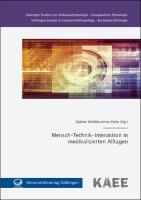Mensch-Technik-Interaktion in medikalisierten Alltagen
Contributor(s)
Wöhlke, Sabine (editor)
Palm, Anna (editor)
Collection
AG UniversitätsverlageLanguage
GermanAbstract
Increasing mechanization is profoundly changing our social areas of life as well as cultural orders and knowledge systems. Concepts of health and illness are also permeated by such technology. A variety of communication techniques are used in the medicalized everyday life: new biotechnologies are combining with home and life techniques; for a long time, a digital self-measurement market has been developed by application techniques; such as, Smartphones, data glasses and Smartwatches. In the meantime, it is easier and faster to operate medical devices and systems. In addition, the data obtained can be exchanged and analyzed faster and faster. A so-called assisted health technology and new information and communication options make the interface between human and machine blurred. The anthology addresses fundamental social, cultural and ethical questions of human-technology interaction and, from a cultural and social scientific research perspective, addresses the question of how technology alters everyday life, cultural orders and knowledge systems. Die zunehmende Technisierung verändert weitreichend gesellschaftliche Lebens- und Arbeitsbereiche sowie kulturelle Ordnungen und Wissenssysteme. Konzepte von Gesundheit und Krankheit werden dabei von dieser Technisierung durchdrungen. Eine Vielzahl von Kommunikationstechniken finden mittlerweile ihren Einsatz in medikalisierten Alltagen: neue Biotechnologien verbinden sich mit Techniken des häuslichen Alltags, es hat sich längst ein digitaler Selbstvermessungsmarkt durch Anwendungstechniken wie z.B. Smartphones, Datenbrillen und SmartWatches entwickelt. Es lassen sich medizinische Geräte und Systeme immer einfacher bedienen, die gewonnenen Daten können dabei immer schneller ausgetauscht und ausgewertet werden. Sogenannte assistierte Gesundheitstechnologien, neue Informations- und Kommunikationsmöglichkeiten lassen die Schnittstelle zwischen Mensch und Maschine unscharf werden. Der Sammelband thematisiert grundlegende soziale, kulturelle und ethische Fragen der Mensch-Technik-Interaktion und widmet sich aus kultur- und sozialwissenschaftlicher Forschungsperspektive der Frage, inwieweit Technik den Alltag, kulturelle Ordnungen und Wissenssysteme verändert. Methodisch vereint der Band historisch wie gegenwartsbezogene Beiträge, die unterschiedliche, empirische Quellen in den Blick nehmen: So reicht die Bandbreite von (Ego-)Dokumente über Medienquellen bis hin zu akteurszentrierten Fallbeispielen.
Keywords
Technisierung; Artefakt (Archäologie); Diabetes mellitus; Korsett; Prothese; Therapie; Tiefe HirnstimulationDOI
10.17875/gup2018-1089OCN
1147264452Publisher
Universitätsverlag GöttingenPublication date and place
2018Classification
Society and Social Sciences


 Download
Download